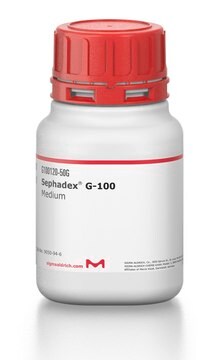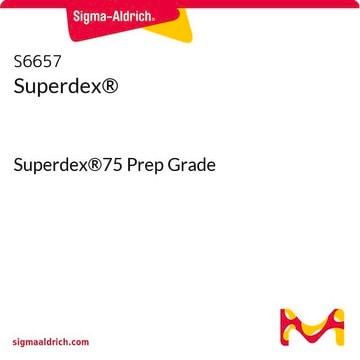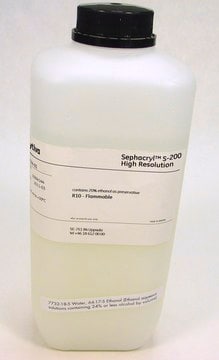S100HR
Sephacryl®
100-HR, MW range 1000-100,000 Da (globular proteins)
Synonym(s):
Poly([allyl dextran]-co-N,N′-methylenebisacrylamide)
About This Item
Recommended Products
description
stability: stable to 0.2M NaOH
form
suspension (20% aqueous ethanol)
feature
autoclavable
matrix
crosslinked allyl dextran/N,N′-methylenebisacrylamide copolymer
particle size
25-75 μm (wet)
25-75 μm (wet)
pore size
1000-100,000 Da MW range (globular proteins)
compatibility
mode of use size exclusion chromatography
storage temp.
2-8°C
Looking for similar products? Visit Product Comparison Guide
Related Categories
General description
- Supplied swollen, suspended in 20% aqueous ethanol
- Autoclavable
- Stable to 0.2N sodium hydroxide (NaOH)
- Store at refrigerated temperature (2-8 °C)
Application
- to develop a novel high-throughput screening assay for sickle cell disease drug discovery
- to purify and characterize ovine pancreatic elastase as well as a lysozyme from human urine
Legal Information
related product
Signal Word
Warning
Hazard Statements
Precautionary Statements
Hazard Classifications
Flam. Liq. 3
Storage Class Code
3 - Flammable liquids
WGK
WGK 1
Flash Point(F)
100.4 - 109.4 °F - closed cup
Flash Point(C)
38 - 43 °C - closed cup
Personal Protective Equipment
Certificates of Analysis (COA)
Search for Certificates of Analysis (COA) by entering the products Lot/Batch Number. Lot and Batch Numbers can be found on a product’s label following the words ‘Lot’ or ‘Batch’.
Already Own This Product?
Find documentation for the products that you have recently purchased in the Document Library.
Customers Also Viewed
Our team of scientists has experience in all areas of research including Life Science, Material Science, Chemical Synthesis, Chromatography, Analytical and many others.
Contact Technical Service













